英语(北师大版必修模块4):unit 12 lesson 3 living abroad课件
文档属性
| 名称 | 英语(北师大版必修模块4):unit 12 lesson 3 living abroad课件 |

|
|
| 格式 | rar | ||
| 文件大小 | 1.6MB | ||
| 资源类型 | 教案 | ||
| 版本资源 | 北师大版 | ||
| 科目 | 英语 | ||
| 更新时间 | 2011-01-14 00:00:00 | ||
图片预览

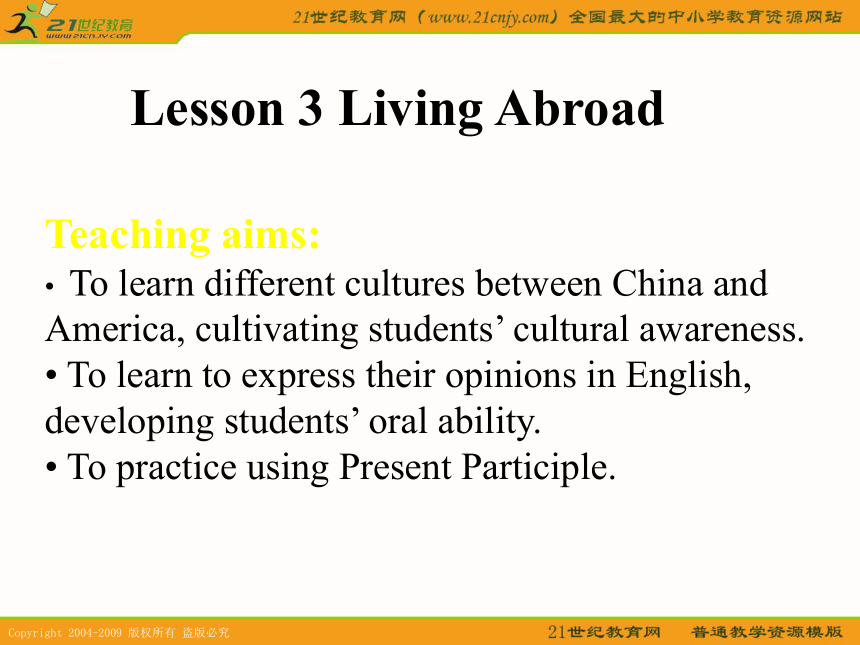
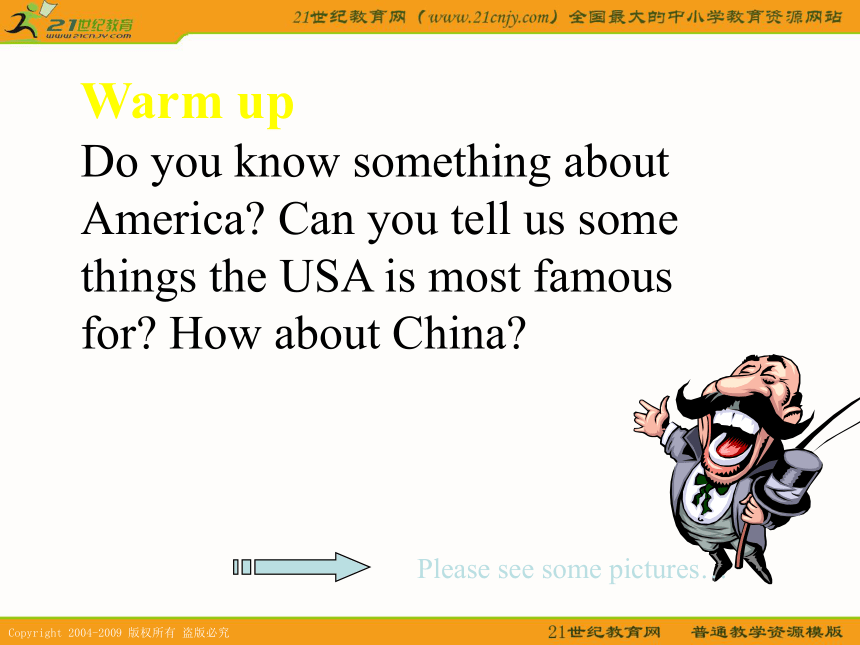

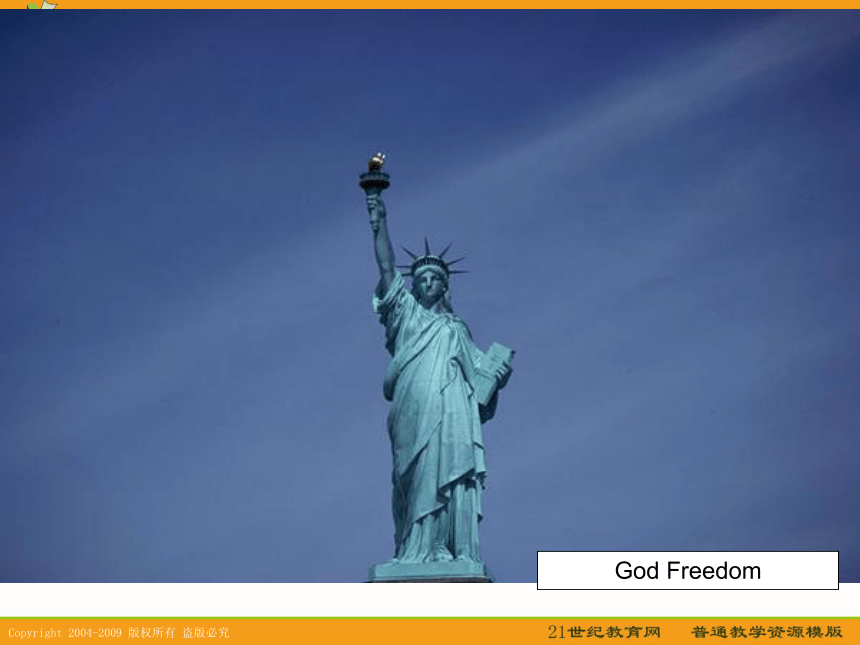

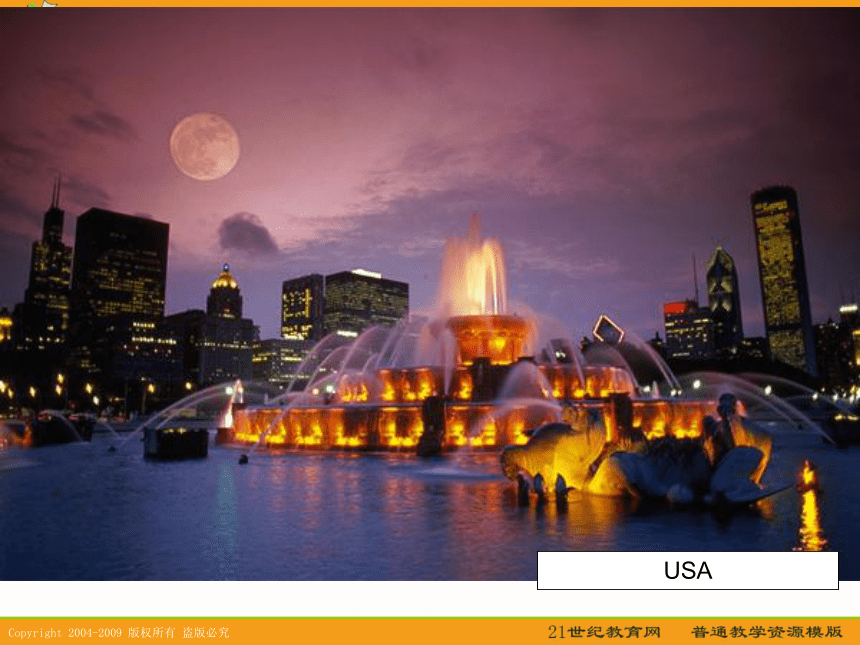
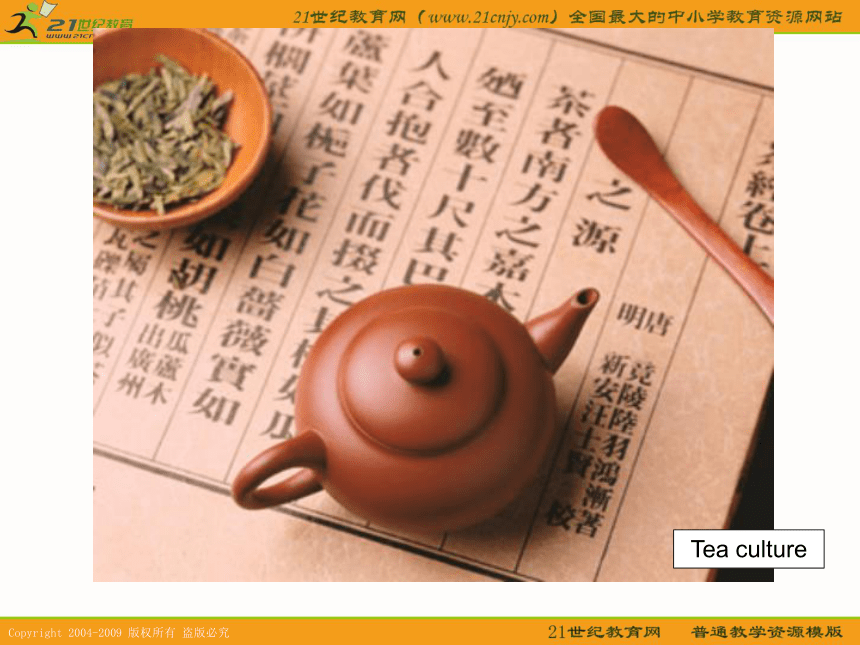
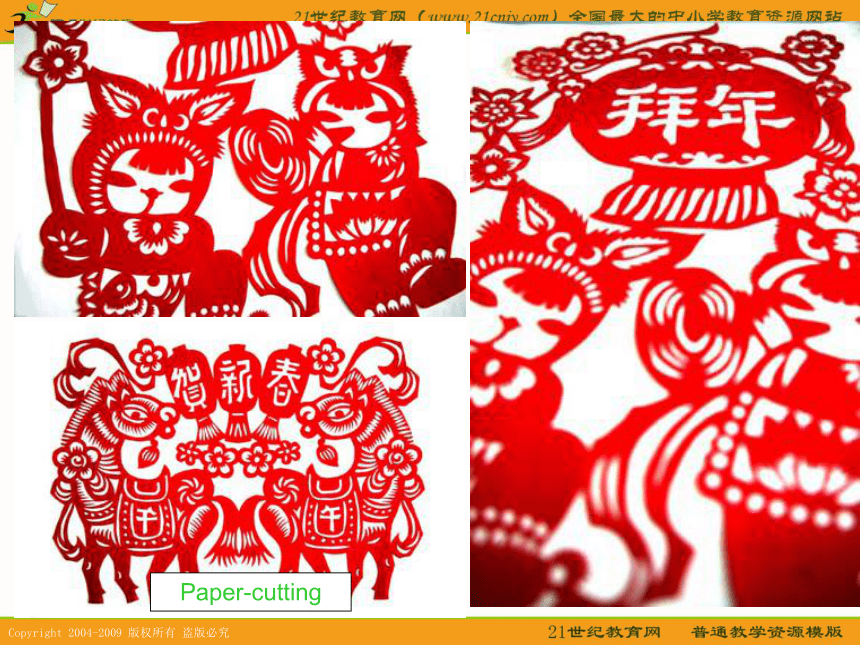
文档简介
课件24张PPT。GOOD
MORNING!!!
Lesson 3 Living Abroad
Teaching aims:
To learn different cultures between China and America, cultivating students’ cultural awareness.
To learn to express their opinions in English, developing students’ oral ability.
To practice using Present Participle.
Warm up
Do you know something about
America? Can you tell us some
things the USA is most famous
for? How about China?Please see some pictures…White HouseGod FreedomNew YorkUSATea culturePaper-cuttingdrumsLion danceDragon boatLantern & QipaoLucky knotsFolk art: tiger head shoesPlease read the two dialogues and answer the following question:
Why did they have difficulty understanding the American and Chinese ways of doing things?Because they didn’t know the culture.Dialogue 1
Jin Li: When I first arrived in San Francisco, I had a difficult time understanding the American way of doing things. Once I went to visit an American friend. After staying for the whole evening, I was about to leave. But as soon as we said goodbye, my friend went back to his room closing the door behind him. It made me feel that I was not really welcome. Wang Lei: I once had an embarrassing experience in a New York restaurant. I was talking to my American friend Janice at the table when I noticed people staring at us. I asked Janice what was wrong and she told me that I was talking too loud. She said m to some American people, p sound like shouting.
Dialogue 2
Martin: What did I learn from my exciting cultural exchange to China? Well, the Chinese are extremely hospitable. One evening, I was invited to a Chinese family dinner. I had a good appetite and ate a lot of delicious food. My host kept on putting more food in my rice bowl. They didn’t seem to hear me saying ‘No, thank you’. This was a very special experience I had in China. In my culture, you don’t get more food if you don’t ask for more.
Tom: I had a similar experience last time when I visited China. Chinese are the most friendly people I have ever met. After my visit to a Chinese family, my friend’s grandfather wouldn’t let me go to the station alone. He insisted on walking me to the station to see me off, I kept saying that I knew the way myself , but it just did not work. What he did was amazing, this will not happen in many other cultures, I guess. Tina: Chinese people are very modest too. Last time, when I visited China, we saw the tour guide wearing a very pretty coat on the day we left. I told her the coat suited her, but she looked very embarrassed saying that it was a cheap one she had bought a long time ago. I was surprised. In my culture, when we hear this, we will feel very happy and say thanks. Read to learn Are these sentences true ( T ), false ( F ) or with no information provided ( NI ).
( ) 1. Martin stayed in China with a local family.
( ) 2. Tom couldn’t understand why his friend’s grandfather wanted to go
with him to the bus station.
( ) 3. Tina was a friend of the tourist guide. To be continuedNITNI( ) 4. Jin Li adjusted well to the American way of life soon after arriving in the USA.
( ) 5. We know Jin Li has at least one American friend.
( ) 6. Wang Lei never went back to the restaurant in New York again.
GO ON…FTNIVocabulary PracticeFind the words in the the text which mean the following:
To give someone something and receive the same kind of thing from them. ( )
2. A desire for food. ( )
3. People who have guests. ( )
exchangeappetitehost A place where you can buy and eat a meal. ( )
5. To be right for a particular person. ( )
Friendly, welcoming, and generous to visitors. ( )
Extremely good especially in an unexpected way. ( )
8. Feeling shy and uneasy. ( )
restaurantsuithospitableamazingembarrassed
Voice your opinionWhat do you think are most important to you if you have a chance to visit a city for the first time, its place, its food or its architecture?
MORNING!!!
Lesson 3 Living Abroad
Teaching aims:
To learn different cultures between China and America, cultivating students’ cultural awareness.
To learn to express their opinions in English, developing students’ oral ability.
To practice using Present Participle.
Warm up
Do you know something about
America? Can you tell us some
things the USA is most famous
for? How about China?Please see some pictures…White HouseGod FreedomNew YorkUSATea culturePaper-cuttingdrumsLion danceDragon boatLantern & QipaoLucky knotsFolk art: tiger head shoesPlease read the two dialogues and answer the following question:
Why did they have difficulty understanding the American and Chinese ways of doing things?Because they didn’t know the culture.Dialogue 1
Jin Li: When I first arrived in San Francisco, I had a difficult time understanding the American way of doing things. Once I went to visit an American friend. After staying for the whole evening, I was about to leave. But as soon as we said goodbye, my friend went back to his room closing the door behind him. It made me feel that I was not really welcome. Wang Lei: I once had an embarrassing experience in a New York restaurant. I was talking to my American friend Janice at the table when I noticed people staring at us. I asked Janice what was wrong and she told me that I was talking too loud. She said m to some American people, p sound like shouting.
Dialogue 2
Martin: What did I learn from my exciting cultural exchange to China? Well, the Chinese are extremely hospitable. One evening, I was invited to a Chinese family dinner. I had a good appetite and ate a lot of delicious food. My host kept on putting more food in my rice bowl. They didn’t seem to hear me saying ‘No, thank you’. This was a very special experience I had in China. In my culture, you don’t get more food if you don’t ask for more.
Tom: I had a similar experience last time when I visited China. Chinese are the most friendly people I have ever met. After my visit to a Chinese family, my friend’s grandfather wouldn’t let me go to the station alone. He insisted on walking me to the station to see me off, I kept saying that I knew the way myself , but it just did not work. What he did was amazing, this will not happen in many other cultures, I guess. Tina: Chinese people are very modest too. Last time, when I visited China, we saw the tour guide wearing a very pretty coat on the day we left. I told her the coat suited her, but she looked very embarrassed saying that it was a cheap one she had bought a long time ago. I was surprised. In my culture, when we hear this, we will feel very happy and say thanks. Read to learn Are these sentences true ( T ), false ( F ) or with no information provided ( NI ).
( ) 1. Martin stayed in China with a local family.
( ) 2. Tom couldn’t understand why his friend’s grandfather wanted to go
with him to the bus station.
( ) 3. Tina was a friend of the tourist guide. To be continuedNITNI( ) 4. Jin Li adjusted well to the American way of life soon after arriving in the USA.
( ) 5. We know Jin Li has at least one American friend.
( ) 6. Wang Lei never went back to the restaurant in New York again.
GO ON…FTNIVocabulary PracticeFind the words in the the text which mean the following:
To give someone something and receive the same kind of thing from them. ( )
2. A desire for food. ( )
3. People who have guests. ( )
exchangeappetitehost A place where you can buy and eat a meal. ( )
5. To be right for a particular person. ( )
Friendly, welcoming, and generous to visitors. ( )
Extremely good especially in an unexpected way. ( )
8. Feeling shy and uneasy. ( )
restaurantsuithospitableamazingembarrassed
Voice your opinionWhat do you think are most important to you if you have a chance to visit a city for the first time, its place, its food or its architecture?
